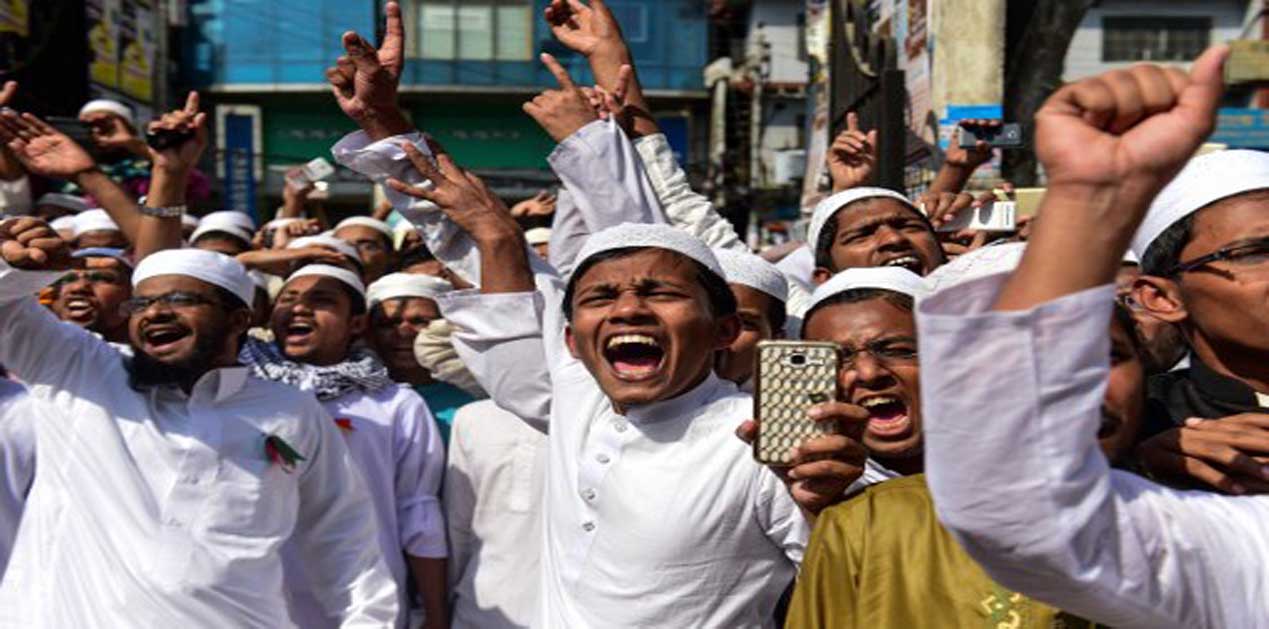The announcement on October 26th at a party forum by Sheikh Hasina that the two foremost hard-line fundamentalist groups, viz. the Jamaat-e-Islami (JeI) and the Hefazat-e-Islam(HeI), should be treated differently, was closely followed by the long delayed Election Commission notification on October 29th cancelling the registration of Jamaat as a political party.
Hasina’s courtship with the Hefazat that had begun a year ago was carried a step further when she attended the Hefazat rally in Dhaka on 4th November organised to thank her for enactment of a law that made Qawmi madrasa Dawra-e-Hadith degrees as equivalent to Masters degrees of other universities. The legislation, passed by Parliament on September 19th, will enable madrasa degree holders in Islamic and Arabic studies to enter government service. Perhaps swayed by the fulsome gratitude of the Hefazat, Sheikh Hasina declared from its platform that her government will construct over 500 madrasas, and if necessary, with funding from Saudi Arabia.
In the past Sheikh Hasina has been accused of being an infidel, and her party, the Awami League, labelled as anti-Islam. Most hard-line Islamic outfits in Bangladesh have in the past identified themselves with the opposition Bangladesh Nationalist Party (BNP), especially the Jamaat which even had ministers in the cabinet when Begum Khaleda Zia was the Prime Minister. The Awami League had its share of Islamic parties as supporters, such as the Bangladesh Tariquat Federation and the Zaker Party which adhered to the more tolerant stream of Sufi Islam.
Over the past few years the main hard-line Islamic party, viz. the JeI, has been considerably emasculated with many of its top leadership convicted by the War Crimes Tribunal. Some of them have been hanged and few are serving life sentences. However while the organisational structure of the party has been thrown into disarray, at the grass root level the cadre strength remains intact and the ideology of fundamentalist Islam remains attractive for a large swathe of the country’s population. It is recognition of this ground reality that has undoubtedly prompted Sheikh Hasina to woo the Hefazat - the other hard-line Islamic outfit - and garner its endorsement in the upcoming General Election.
While Hasina can rightfully claim credit for dismantling the Jamaat by vigorously pursuing the War Crimes Trials and taking bold decisions to carry out the judicial verdicts, her actions in actively wooing the Hefazat is a tacit admission of failure to rein in the fundamentalist forces in Bangladesh despite her two consecutive terms as Prime Minister. Over the last few years, the rising number of Hijab wearing women in the streets of Dhaka, the increasing visibility of beard-sporting men wearing above-the-ankle pyjamas, and text-book revisions that include deletion of books by non-Muslim writers to indoctrinate impressionable minds, are but overt manifestations of the rising influence of hard-core Islamic ideas seeking to replace the syncretic cultural ethos that underpinned the 1971 Liberation War. The spate of attacks in 2015-16 on liberal bloggers and the dastardly cafe attack in May 2016 are testimony to the threat that such creeping Islamisation pose to the emergence of a truly secular Bangladesh. What is worse is that the militant Islamic ideology has spread to upper levels of society, as brought out by the background of the Holey Bakery attackers.
Perhaps sensing that she is at the risk of losing her secular credentials and the accolades that she won by going after the 1971 War criminals, Sheikh Hasina has sought to justify that Hefazat, although an Islamist outfit, is different from the Jamaat. Addressing party leaders at her residence on 26th October she advised them not to hyphenate Jamaat and Hefazat. She emphasised that while Jamaat is an anti-national force that was against liberation of Bangladesh, the Hefazat identified itself with the country. However, this narrative conceals the fact that Hefazat did not exist in 1971 during the freedom struggle, and also overlooks that both support Islamic theocracy and are vituperatively intolerant of other faiths.
Ironically, it was only as recently as May 2013 that Hefazat had laid siege in Dhaka and challenged the Sheikh Hasina led Awami League government. At that time Hasina ignored the 13-point demand of the Hefazat, that included framing of anti-blasphemy laws, curbs on women’s rights, and similar other obscurantist proposals. Security agencies had to use force to evict the congregation in central Dhaka from where fiery speeches were delivered by Hefazat leaders. Since then, while the outfit has not publicly climbed down from any of its demands, Sheikh Hasina has conceded some of these, such as the recognition of Qawmi madrasa degrees, and more recently strenuous efforts to favourably position the Hefazat in public discourse. While apologists for the Awami League may term the current stance as political expediency in the run-up to the General Elections in which Sheikh Hasina is seeking an unprecedented third consecutive term as PM, neutral observers view it as an ideological shift from the core values on which the Awami league was formed.
Whether it is political compulsions or ideological shift, the Awami League runs the risk of falling between the two stools of preserving its secular credentials on the one hand and pandering to hard-line Islamic elements on the other. While the impact of Sheikh Hasina’s strategy on the election outcome is unclear, what is certain is that pampering fundamentalist Islamic groups brings with it the danger of rising Islamic militancy in the region. It is especially worrisome for India as the Awami League has often been seen as the only major political bulwark against Islamic radicalism in Bangladesh. It is therefore unfortunate that rather than promoting groups that profess softer and more tolerant version of Islam the ruling party has resorted to pandering to the hard-line Hefazat.
All over the world, historical evidence suggests that controlling such extreme right-wing groups or modifying their outlook is next to impossible; and therefore any hope that Sheikh Hasina may nurture of reining in the Hefazat after the election may be wishful thinking on her part. For the region, any compromise with radical groups may pose security threats beyond the borders of Bangladesh, especially given the defeat and dispersal of ISIS from the middle-east.
(The author is a former Special Secretary, Cabinet Secretariat, Government of India)
(The paper is the author’s individual scholastic articulation. The author certifies that the article/paper is original in content, unpublished and it has not been submitted for publication/web upload elsewhere, and that the facts and figures quoted are duly referenced, as needed, and are believed to be correct). (The paper does not necessarily represent the organisational stance... More >>
Image Source: https://media.dhakatribune.com/uploads/2017/02/Hefazat-1.jpg










Post new comment